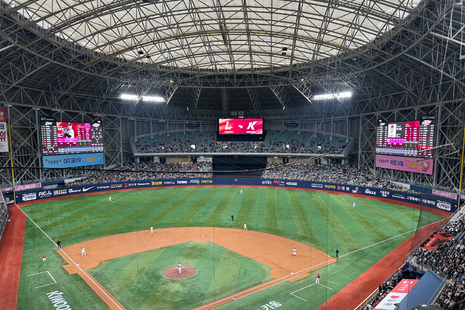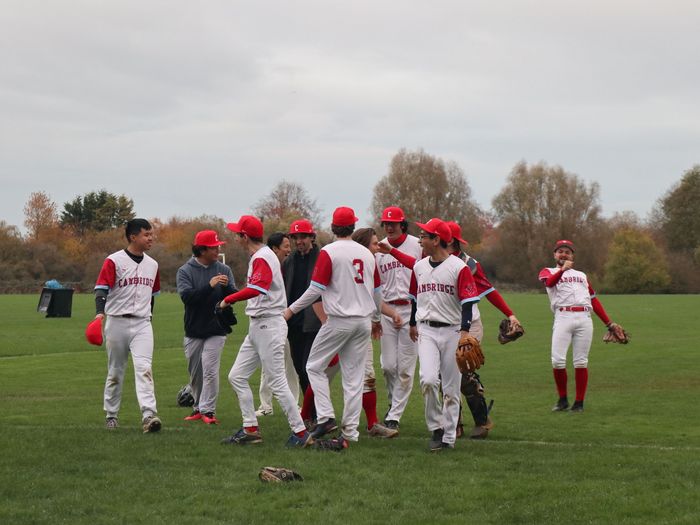Experiencing Korean baseball
Max Eshelby explores South Korea’s most popular sport and its local cultural eminence.

Sport is a universal language, but its dialects vary widely. That’s why, for me, the highlight of any trip abroad is experiencing local sporting events. As a football fan, this usually involves seeking out a match wherever I am. I’m fascinated by the stadiums, the supporters, and the rituals that shape matchdays – all of which offer a vivid insight into how different cultures express belonging and identity through sport.
But it was actually the opportunity to experience a baseball match that left the most lasting impression on me following a trip to South Korea earlier this year. While I still made time for football, what truly stood out to me was discovering South Korea’s rich baseball culture.
“As exciting as the action on the field was, the real spectacle was in the stands”
Baseball in South Korea has an extensive history. Introduced in the late nineteenth century by American missionaries, the sport steadily took root, with Korean teams competing in Japanese tournaments and against touring American sides. Despite the collapse of Japanese rule and the division of the Korean Peninsula shortly after the Second World War, baseball continued to grow in popularity, culminating with the formation of the Korean Baseball Organisation and the professionalisation of the sport. Baseball has become one of South Korea’s most popular sports to both watch and play and a staple of modern Korean popular culture.
Naturally, then, I decided to brave Seoul’s chaotic March weather and visit the Gocheok Sky Dome to watch the Seoul-based Kiwoom Heroes face the SSG Landers from nearby Incheon. Unlike most major ballparks in the country, the Sky Dome is an enclosed, domed venue, making for a particularly unique experience. The buzz in the Sky Dome’s vicinity was immediate and noticeable, with fans of both teams socialising over local delicacies and sharing the pre-match atmosphere.
“It’s not difficult to see why baseball boasts such a passionate following in South Korea”
The game itself was an enjoyable watch, even for someone with virtually no knowledge of the sport. SSG struck early, but an incredible fourth innings from Kiwoom saw them draw level, aided by a fantastic home run from Song Sun-mun. Both sides fumbled opportunities to gain an advantage over the other, but SSG were able to swing the match’s momentum in their favour by the conclusion of the eighth innings, scoring six runs and sealing an 8-2 victory. It was a frustrating afternoon for Kiwoom, with their unbeaten run ending – but as a spectator, the drama was more than enough to keep me entertained.
As exciting as the action on the field was, the real spectacle was in the stands. Korean baseball fandom is certainly distinctive – it’s highly organised, relentlessly upbeat, and deeply woven into South Korea’s popular sporting identity. Most ballparks have designated cheering sections for both home and away teams, complete with a ‘csheer master’ who stands on a raised platform to direct chants and dance routines. Teams and individual players have their own fight songs, often adapted from K-pop hits, and the music never stops throughout. This all combines to create a truly energetic and unforgettable atmosphere.
“Complete with a ‘cheer master’ who stands on a raised platform to direct chants and dance routines”
This was the part that truly surprised me. Although I only had a vague understanding of baseball, and an even poorer grasp of the Korean language, the crowd made it easy to follow the action unfolding on the field. Fans don’t watch baseball passively: they are singing, dancing, and shouting throughout. The sense of community in the stand was palpable, with a real connection between fans and their teams.
In this respect, it’s not difficult to see why baseball boasts such a passionate following in South Korea. It offers something that goes beyond the events unfolding on the field: an exciting mixture of sport, entertainment, and collective experience. Whilst the KBO League struggles to enjoy the same global visibility as the likes of Major League Baseball, it still boasts a compelling cultural identity that is certainly unique.
Leaving the Sky Dome that afternoon, I found myself reflecting on how much of a culture you can absorb just by attending a sporting event. Baseball here is not just about home runs and strikeouts: it’s about passion, community, and identity. For any sports enthusiast travelling to that part of the world, it’s one of the most immersive ways to experience local culture. It’s a night out, a tradition, and above all, a truly memorable experience.
 News / Judge Business School advisor resigns over Epstein and Andrew links18 February 2026
News / Judge Business School advisor resigns over Epstein and Andrew links18 February 2026 News / Hundreds of Cambridge academics demand vote on fate of vet course20 February 2026
News / Hundreds of Cambridge academics demand vote on fate of vet course20 February 2026 News / Petition demands University reverse decision on vegan menu20 February 2026
News / Petition demands University reverse decision on vegan menu20 February 2026 News / CUCA members attend Reform rally in London20 February 2026
News / CUCA members attend Reform rally in London20 February 2026 News / Gov grants £36m to Cambridge supercomputer17 February 2026
News / Gov grants £36m to Cambridge supercomputer17 February 2026










